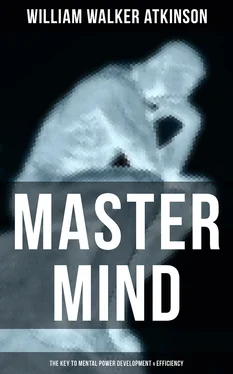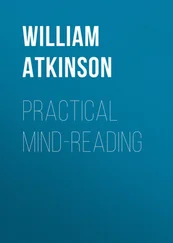A leading psychologist has said: "Suppose a child of intelligent parents were ushered into the world without a nerve leading from his otherwise perfect brain to any portion of his body; with no optic nerve to transmit the glorious sensations from the eye, no auditory nerve to conduct the vibrations of the mother's voice, no tactile nerves to convey the touch of a hand, no olfactory nerve to rouse the brain with the delicate aroma of the orchards and the wild flowers in spring, no gustatory, thermal, or muscular nerves. Could such a child live, as the years rolled on, the books of Shakespeare and of Milton would be opened in vain before the child's eyes. The wisest men might talk to him with utmost eloquence all to no purpose. Nature could not whisper one of her inspiring truths into his deaf ear, could not light up that dark mind with a picture of the rainbow or of a human face. No matter how perfect might be the child's brain and his inherited capacity for mental activities, his faculties would remain for this life shrouded in Egyptian darkness. Perception could give memory nothing to retain, and thought could not weave her matchless fabrics without materials."
Another psychologist has said: "If it were possible for a human being to come into the world with a brain perfectly prepared to be the instrument of psychical operations, but with all the inlets to sensations closed, we have every reason to believe that the mind would remain dormant like a seed buried in the earth." Another says: "That the powers of the understanding would forever continue dormant were it not for the action of things external to the body, is a proposition now universally admitted by philosophers." Another says: "Apprehension by the senses supplies directly or indirectly the material of all human knowledge, or at least the stimulus necessary to develop every inborn faculty of the mind.'' Another says: "Even the highest ideas are slowly and gradually developed from the accumulation of sense experiences, and their truth is only guaranteed by the possibility of finding concrete examples for them in real existence. Another says: "The activity of the mind is just as much the result of its consciousness of external impressions, by which its faculties are called into play, as the life of the body is dependent upon the appropriation of nutrient materials and the constant influence of external forces." And another: "The senses are the means by which the mind obtains its knowledge of the outside world. Shut out from all direct communication with the outer world, it knows, and can know, nothing of what exists or is passing there, except what comes to it through the senses. Its knowledge of what is external to itself is therefore dependent upon the number, state, and condition of the sensory organs.''
In short: Psychologists hold that if a human being were born without sense organs, no matter how perfect a brain he might have, his life would be little more than that of the plant. He would exist in a dreamlike state, with only the faintest manifestations of consciousness. His consciousness would not be able to react in response to the impact of contact with the outside world, for there would be no such impact. And as consciousness depends almost entirely upon the impact of, or resistance to, outside impressions, his power of consciousness would be practically not called into play. He would perhaps be conscious of his own existence, but would probably never realize the fact fully, for he would have nothing else with which to compare himself, and his self-consciousness would not be aroused by the presence and pressure of the "not self." Such a man would not even have the memories of previous sensations, or experiences, to arouse or to heighten his consciousness or thought—and, consequently, he would have no imagination to use. He would be, to all intents and purposes, a "living corpse."
Helen Kellar had only two doors of sensation closed to her—the sense of Sight and that of Hearing. Touch, Taste, and Smell, however, were left to her; and each was quickened and heightened in order to help as far as possible to perform the work properly belonging to the defective senses. Her sense of Touch, especially, was wonderfully increased and quickened into activity; and through this channel her "self" was finally reached and communicated with by loving friends and teachers. The result in this particular case was almost a miracle—yet only two senses were missing. To get the full realization of the importance of the senses, one had but to think of the mental state of a Helen Kellar deprived from birth of the sense of Touch!
Arising from the above line of thought is the realization, that just as the world of the individual is decreased by each sense subtracted from him, so would his world be increased by each sense that might be added to him. And daring minds consider it not improbable that the human race, in the course of evolution, may eventually develop other and more complex senses. Even as it is, man is able to perceive only a limited number of sound sensations—there are many sounds above and below his scale that he is unable to perceive, but which are registered on instruments. Likewise, there are light waves below and above the human scale of perception, but which are caught by delicate instruments. And, at present, man is unable to "sense" electrical waves, or magnetic waves—though, theoretically, it is possible for him to sense these vibrations as well as light waves, or sound waves, the difference between these various "waves" being simply that of the rate of vibration. Imagine what a new world would be opened to man if he could sense the waves of electricity. In that case he could "see" things as far off as these waves could carry, and even though solid objects intervened—just as now, by means of an artificial screen, he is able to see through solid objects by means of the X-Ray. This is by no means a fanciful idea.
A leading authority has said: "If a new sense or two were added to the present normal number, in man, that which is now the phenomenal world for all of us might, for all that we know, burst into something amazingly different and wider, in consequence of the additional revelation of these new senses." And another says: "It is not at all improbable that there are properties of matter of which none of our senses take immediate cognizance, and which other beings might be able to see in the same manner that we are sensible to light, sound, etc." Another says: ""We know that our sensory nerves are capable of transmitting to the brain only a part of the phenomena of the universe. Our senses give us only a section of the world's phenomena. Our senses usher only certain phenomena into the presence of our minds. If we had three or four new senses added, this might appear like a new world to us; we might become conscious of a vast number of phenomena, which at present never have any effect upon our nervous organisms. It is possible to imagine a race of beings whose senses do not resemble ours, inhabiting other worlds."
A fanciful illustration of the part played by the senses in our mental world is offered by a writer who says: "The late Professor James once suggested as a useful exercise for young students a consideration of the changes which would be worked in our ordinary world if the various branches of our receiving instruments happened to exchange duties; if, for instance, we heard all colors, and saw all sounds. All this is less mad than it seems. Music is but an interpretation of certain vibrations undertaken by the ear, and color but an interpretation of other vibrations undertaken by the eye. Were such an alteration of our senses to take place, the world would still be sending us the same messages, but we should be interpreting them differently. Beauty would still be ours, though speaking another tongue. The birds' song would then strike our retina as a pageant of color: we should see all the magical tones of the wind, hear as a great fugue the repeated and harmonized greens of the forest, the cadences of stormy skies. Did we realize how slight an adjustment of our own organs is needed to initiate us into such a world, we should perhaps be less contemptuous of those mystics who tell us that in moments of transcendental conscious they 'heard flowers that sounded, and saw notes that shone,' or that they have experienced rare moments of consciousness in which the senses were fused into a single and ineffable act of perception, in which color and sound were known as aspects of the same thing."
Читать дальше












